Top 17 Prismatic Alternatives & Competitors in 2024

Prismatic.io is a player in the Integration Platform as a Service (iPaaS) space, serving businesses that need to connect applications and streamline workflows. With the growth of cloud services, organizations face challenges in making their different tools and software work together. Prismatic simplifies this process, enabling companies to integrate their applications without complex coding or heavy IT involvement. Their platform delivers easy-to-use features that help teams build connections between software in a more intuitive way than many competitors.
As businesses seek to optimize operations, Prismatic.io positions itself as a reliable option for integration solutions. It offers flexibility and efficiency, serving various industries. This makes it a strong contender in a crowded market. For companies exploring iPaaS options, recognizing the available choices is important—and Prismatic.io stands out as a solution that addresses common integration issues while promoting smoother collaboration.
While prismatic is a great product, it’s always good to shop around and look for alternatives. This article identifies some top competitors and their pros and cons.
Zapier
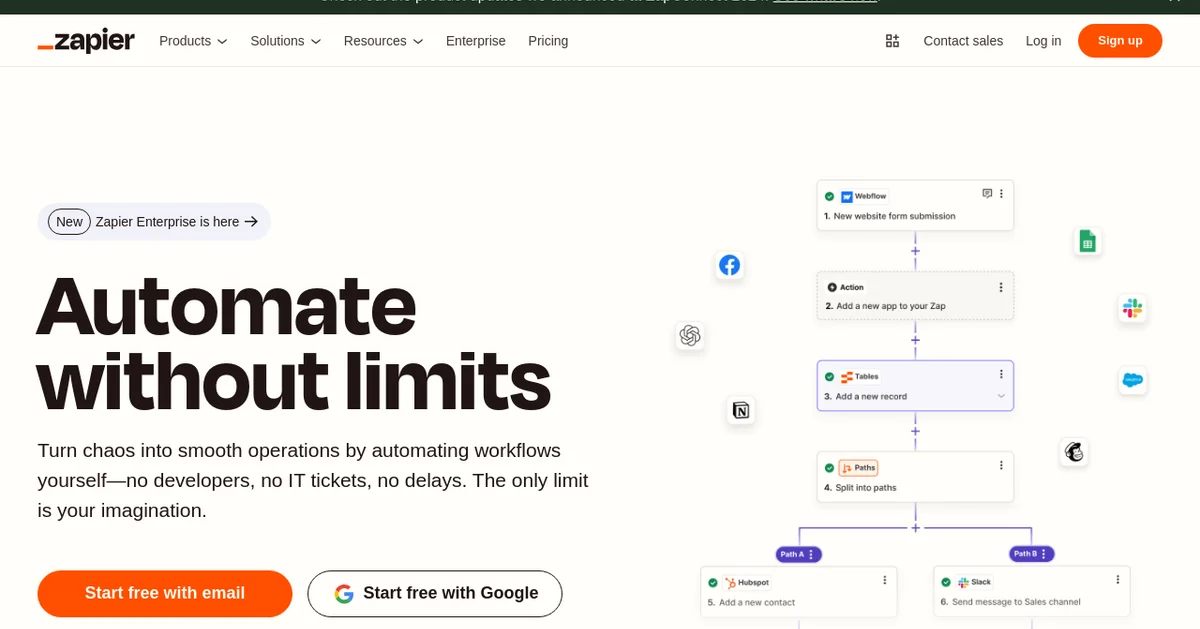
Zapier is a top platform for integration, allowing users to automate workflows without technical skills. Since its start, it has helped over 2.2 million businesses streamline tasks that usually require manual effort. Users can build Zaps, which are connections between apps that trigger specific actions. This flexibility has earned it industry recognition.
One of Zapier’s main features is its ability to integrate with over 7,000 apps. This large library makes it easier for companies to connect tools they already use, simplifying processes. For example, automating lead management or support ticketing frees teams to focus on higher-value tasks. Organizations also benefit from pre-built templates, allowing quick starts without designing workflows from scratch.
Another key aspect is Zapier’s focus on accessibility. Companies of any size can implement automation without needing developers or IT involvement. This approach positions Zapier as an appealing option for businesses seeking cost-effective automation solutions. Its AI features, like smart workflows and custom chatbots, improve user engagement as businesses can use AI for more complex functions like lead qualification.
Zapier offers a versatile platform for businesses seeking automation. Its commitment to ease of use, wide integration capabilities, and innovative features make it a solid choice.
Pros
- Integrates with over 7,000 apps
- Easy to set up and use without coding
- Offers a wide range of templates
- Incorporates AI for smarter workflows
- Suitable for businesses of any size
Cons
- Some features may not meet the needs of advanced users
- Over-reliance on templates can limit customization
MuleSoft
MuleSoft is a key player in the Integration Platform as a Service (iPaaS) market, providing businesses with tools to connect their applications, data, and devices. Their platform, Anypoint Platform, helps organizations build a solid foundation for AI and digital transformation efforts. MuleSoft focuses on making integration simpler, enabling companies to automate workflows and manage data across various systems.
MuleSoft has established itself as a trusted partner for many organizations, processing over 7.5 billion integration transactions daily. It has been recognized as a leader in both iPaaS and API management by analysts like Gartner for nine consecutive years. The platform empowers teams—technical and non-technical—allowing anyone to automate end-to-end processes with easy design tools and pre-built modules. This access to automation and integration boosts productivity.
One of MuleSoft’s notable features is its large library of pre-built connectors for essential enterprise applications. These connectors streamline the integration process, simplifying the connection of legacy systems and modern applications. The API management features provide a consistent way to secure and manage APIs, allowing organizations to create new experiences while controlling their data.
The mix of automation, API management, and a simple interface helps businesses achieve greater efficiency, reduced costs, and faster time-to-market for their projects.
Pros
- Extensive integration capabilities with pre-built connectors
- Strong emphasis on API management and security
- Simple design reducing development challenges
- Proven track record with billions of integration transactions daily
Cons
- May have a steeper learning curve for some users
- Pricing may be higher than smaller competitors
- Some features may be too advanced for smaller organizations
Boomi
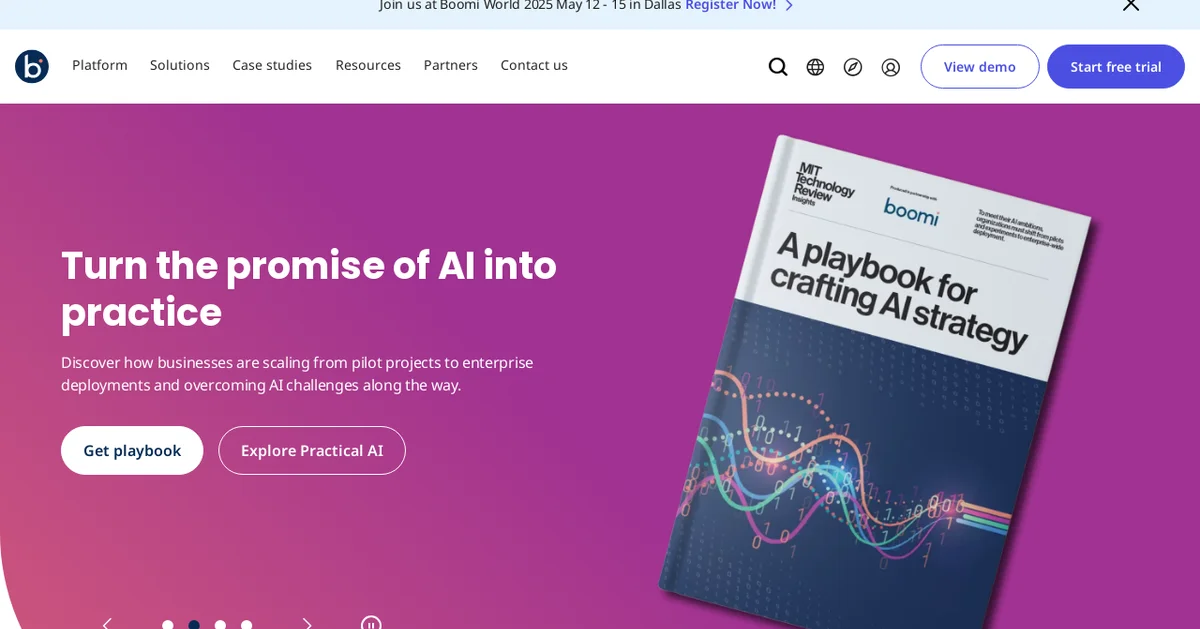
Boomi is a player in the Integration Platform as a Service (iPaaS) market, known for its capabilities in connecting applications, APIs, and data using AI. With a goal to simplify integration, Boomi offers AI-driven solutions that tackle challenges organizations face when streamlining workflows and improving operational efficiency.
Founded on the idea that integration shouldn’t be a technical hurdle, Boomi has established itself as a market leader, recognized by Gartner as a Leader in iPaaS for ten years. This recognition comes from its ability to deliver results for users, showing strong commitment to customer satisfaction.
One of Boomi’s unique features is its API management suite, allowing businesses to discover, manage, and govern their APIs in one central location. This eases the often chaotic API landscape, which can lead to security risks and inefficiencies. Additionally, Boomi’s library of pre-built connectors and integration templates reduces the complexity of connecting different systems, ensuring faster time-to-value for organizations.
Another key benefit is Boomi’s commitment to data management, providing a secure and scalable platform that gives users a trusted view of their data. AI agents improve productivity, enabling companies to automate processes without compromising security.
Boomi’s offerings make it an attractive option for businesses seeking to improve integration and automation across their systems.
Pros
- Strong API management capabilities
- Extensive library of pre-built connectors
- Recognized leader with consistent accolades from Gartner
- Focus on data management and security
- AI-powered automation for greater productivity
Cons
- Steeper learning curve for new users
- May be perceived as more expensive than other options
Workato
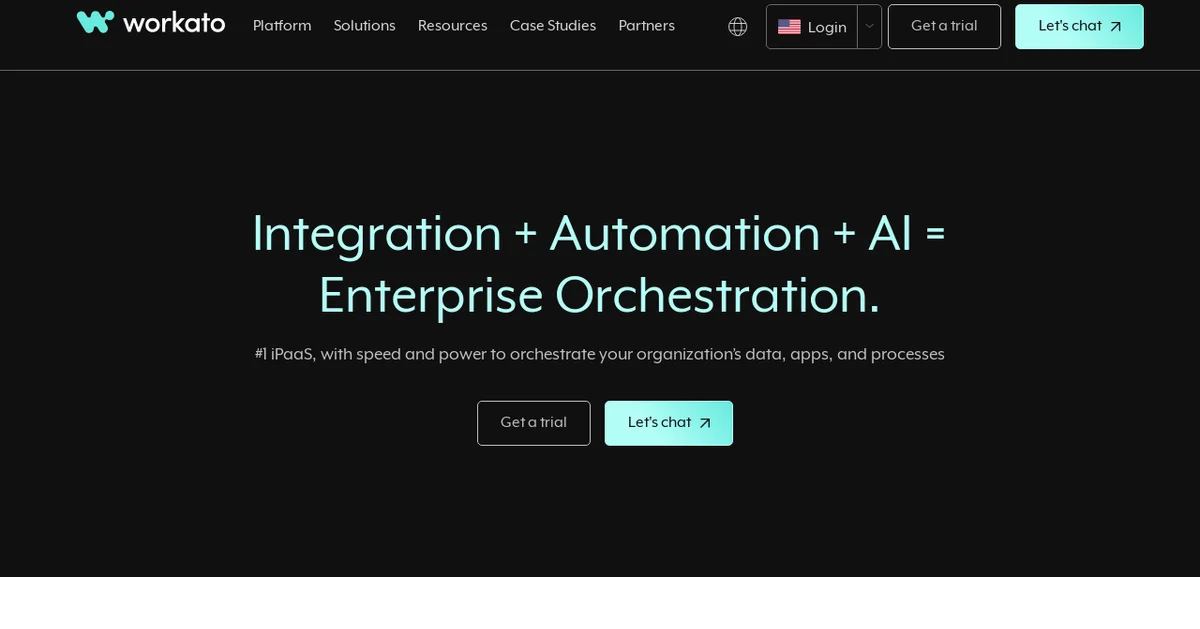
Workato is a key player in the Integration Platform as a Service (iPaaS) space, providing businesses with tools to integrate apps, automate processes, and manage data effectively. The platform allows teams to connect cloud apps, on-premises systems, and more. This integration capability could appeal to organizations seeking to streamline workflows.
One standout feature is its focus on automation combined with AI technology. Their promise of “Enterprise Orchestration” highlights their ability to manage complex data flows and business processes quickly. Businesses can benefit from automated incident management, which improves response times and reduces resolution challenges. Workato’s design prioritizes ease of use while offering robust functionality, enabling teams to create integrations and automations without extensive coding.
Workato has established itself, having been recognized as a leader in the Gartner Magic Quadrant for iPaaS six times. This acknowledgment reflects their reliability and effectiveness in delivering integrations that improve business success. Their client base is impressive, showcasing partnerships with many notable businesses, which adds to their credibility.
What sets Workato apart is their commitment to saving time for users, demonstrated by the reported 100,000+ hours saved in integrating and managing processes. This efficiency leads to real benefits for teams looking to bolster productivity and workflow.
Pros:
- Easy integration with various apps
- AI-driven automation features
- Strong reputation in the iPaaS market
- Significant time-saving tools for teams
Cons:
- May require some learning curve for full use
- Pricing could concern smaller businesses seeking basic features
Tray.io
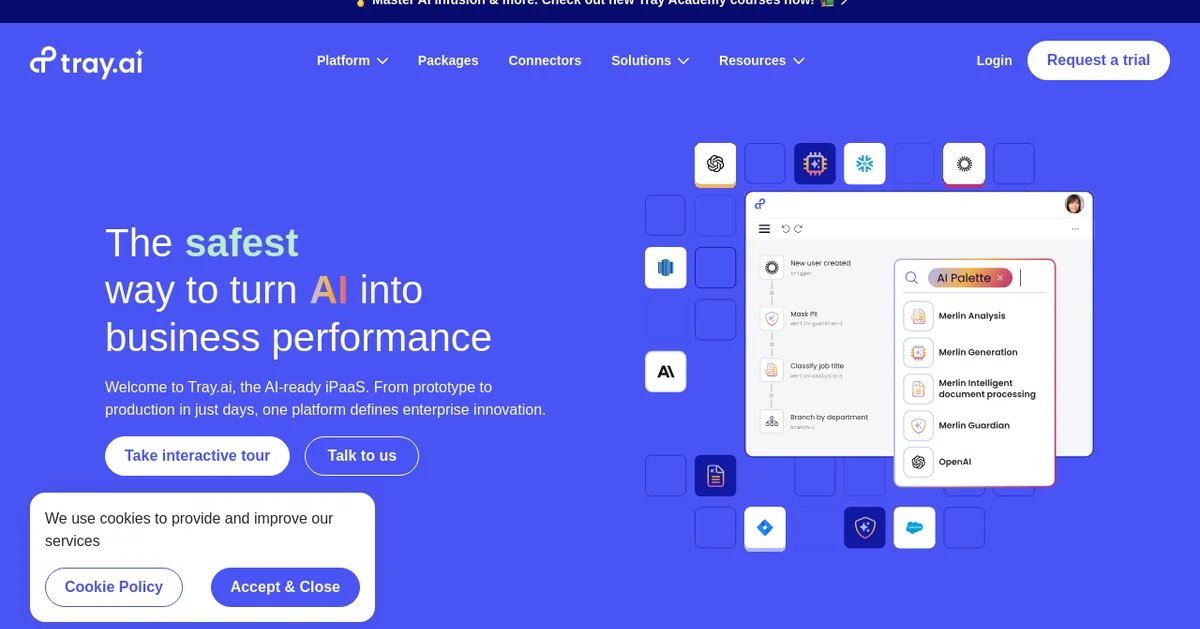
Tray.io is an iPaaS platform that helps businesses adapt quickly in a landscape influenced by AI technologies. Their story centers on the need for speed and flexibility, enabling organizations to turn AI capabilities into real business performance in days instead of months. This positions Tray.io as a strong alternative to alt_17, especially for companies seeking to improve their integration strategies without facing traditional development delays.
A key feature of Tray.io is its low-code platform, which simplifies the creation of integrations and automation workflows. Users can prototype applications quickly, using what Tray calls an “AI Palette,” which allows for a smooth integration of AI into everyday business processes. This flexibility is appealing for teams that need to stay agile and responsive to market changes. The platform also prioritizes governance and safety, addressing data security concerns with features like the Merlin Guardian, which safeguards sensitive information during AI processes.
Tray.io supports a wide range of applications, with capabilities in intelligent lead management, automated onboarding, and optimizing order-to-cash processes. As businesses face increasing pressure to innovate continuously, Tray.io’s focus on rapid deployment and adaptability offers clear competitive advantages.
Pros
- Low-code platform accelerates integration development
- AI-focused features enable quick adaptation to business needs
- Strong data governance and security measures
- Versatile use cases across various business functions
Cons
- Potential learning curve for those new to low-code development
- Ongoing support may be needed for more complex integrations
- Pricing could be a consideration for smaller businesses
SnapLogic
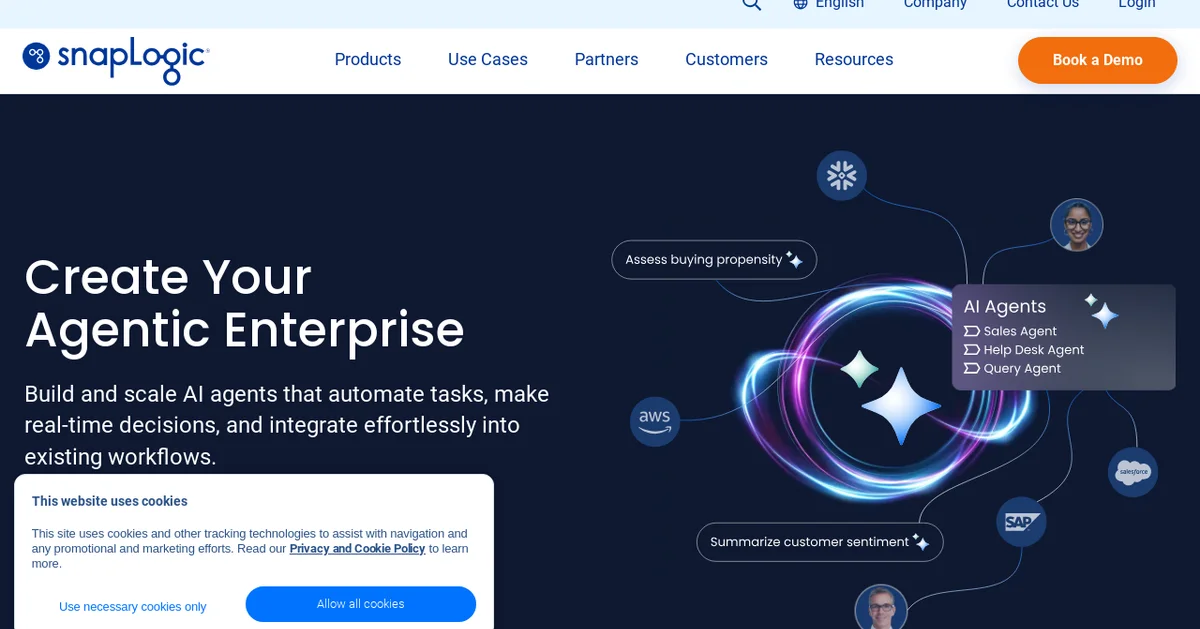
SnapLogic is a key player in the iPaaS market, focused on seamless integration across business applications and data sources. Their mission is to change enterprises by bridging gaps left by outdated systems. SnapLogic’s approach includes creating “Snaps,” pre-built connectors that let users set up integrations quickly without extensive coding. With over 1,000 Snaps available, organizations can automate processes across departments like HR, sales, IT, marketing, and finance.
SnapLogic stands out for its emphasis on generative AI and user empowerment. They enable teams to automate workflows and make data-driven decisions in real time. Companies like Schneider Electric have reported significant productivity boosts, allowing nearly 150 citizen developers to independently create applications and integrations. SnapLogic’s ability to reduce onboarding times—such as a 70% decrease for customers—shows its effectiveness in speeding up business operations.
Recognition in the industry, including being named a Visionary in the Gartner Magic Quadrant for iPaaS and featured on the Inc. 5000 list, highlights their growing influence and commitment to innovation. Customers also mention notable cost savings and efficiency improvements, considering SnapLogic a game-changer in integration.
Choosing SnapLogic over alt_17 provides businesses with a solid platform that integrates tools and applications while empowering teams to advance their processes.
Pros
- Easy, code-free setup with over 1,000 Snaps
- Strong focus on generative AI for real-time decision-making
- Proven track record of increasing productivity and reducing onboarding time
- Extensive industry recognition and credibility
Cons
- Initial learning curve for new users
- Can be pricey for smaller organizations
- Integration capabilities may be overwhelming due to the many options available
Microsoft Power Automate
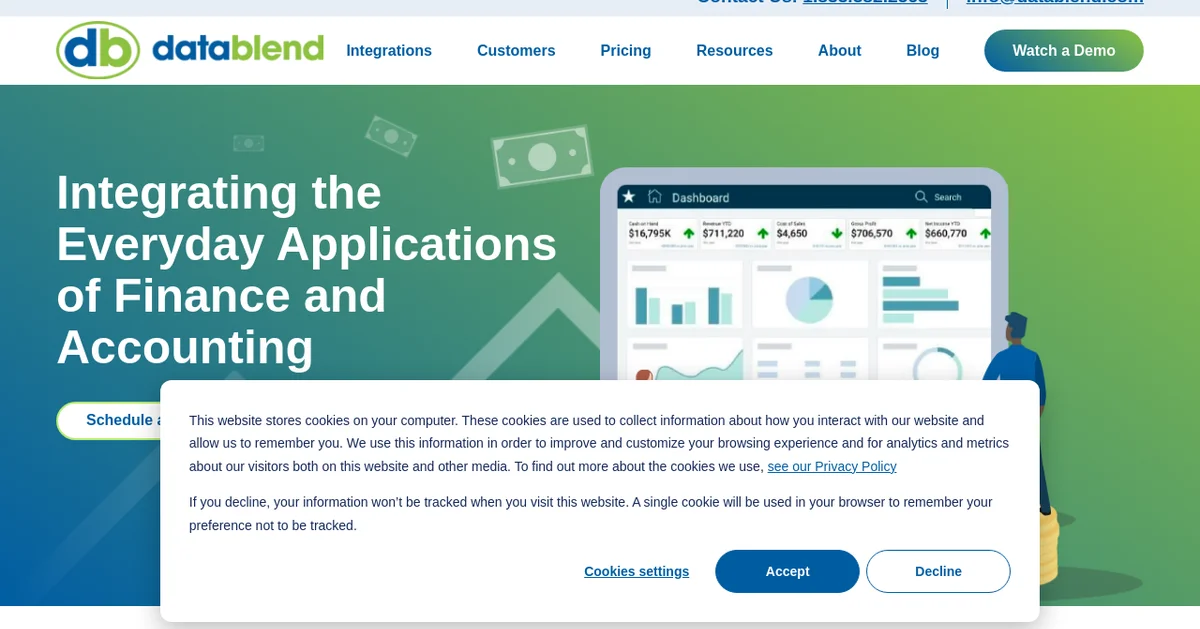
Microsoft Power Automate is an integration platform that helps businesses streamline workflows and automate tasks. It integrates well with other Microsoft products like SharePoint, Dynamics 365, and Office 365. This integration sets Power Automate apart from competitors, including DataBlend.
Power Automate allows users to create automated workflows between apps and services. With a simple interface, even non-technical users can design flows to move data, send notifications, or perform repetitive tasks without writing code. It supports various triggers and actions, making it adaptable for different business needs. The extensive library of pre-built templates lets users start automating processes quickly.
The development of Microsoft Power Automate is about empowerment. It originated from the idea that businesses should avoid mundane tasks and focus on strategic initiatives. This vision resonates with finance and accounting departments that continuously seek efficiency and accuracy.
Power Automate offers strong scalability, meaning as your business grows, your automation capabilities can expand. The platform’s ability to handle large datasets and real-time data integration ensures that organizations maintain data integrity across systems—an increasingly important priority for businesses.
When considering alternatives like DataBlend, Microsoft Power Automate stands out for its integration with the broader Microsoft ecosystem and its ease of use.
Pros
- Integration with Microsoft products
- User-friendly interface for non-technical users
- Library of pre-built templates
- Scalability for growing businesses
Cons
- Limited advanced features compared to specialized platforms
- Dependence on the Microsoft ecosystem may not suit all organizations
- Pricing can rise with added functionality
Jitterbit
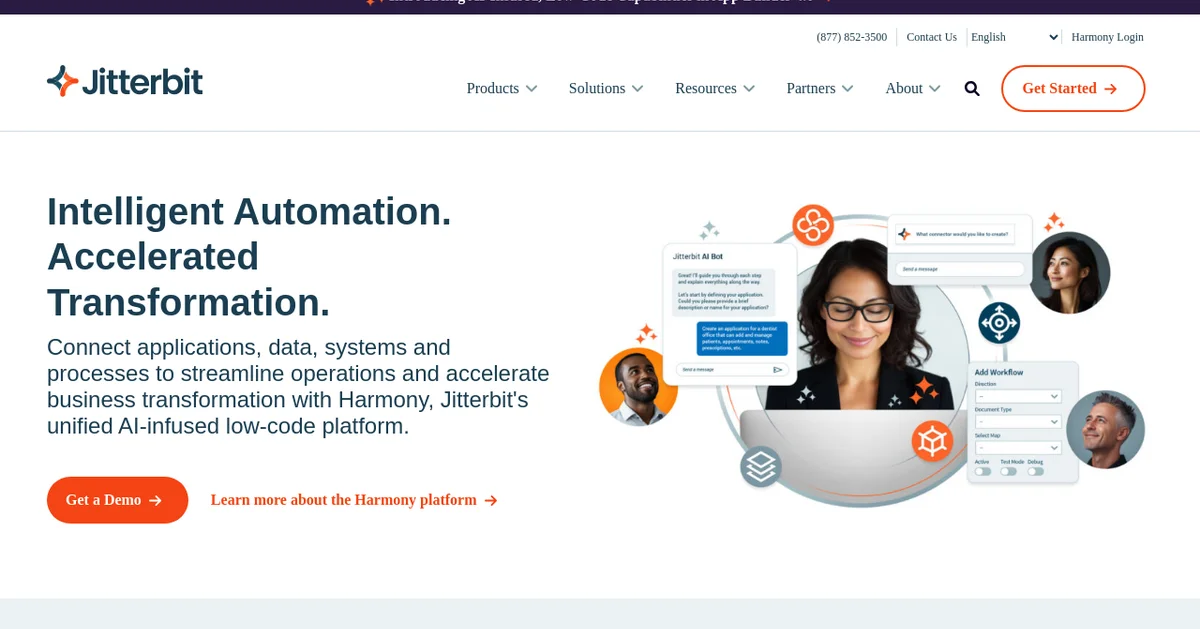
Jitterbit is a key player in the Integration Platform as a Service (iPaaS) market, known for its AI-powered solutions. Their offering, Harmony, is a low-code platform for integration, orchestration, and automation. This platform enables businesses to connect applications, systems, and data seamlessly. Unlike many alternatives, Jitterbit allows users to implement solutions quickly through drag-and-drop pre-built connectors, making it accessible for both IT teams and business users.
A standout feature of Jitterbit is its AI capabilities, which improve the integration process and boost decision-making. This use of artificial intelligence supports automation, helping organizations streamline operations and drive transformation at their own pace. Their focus on reducing organizational friction leads to improved outcomes, making businesses more productive and efficient.
Jitterbit serves a wide range of industries and has built partnerships with platforms like Salesforce, NetSuite, and Shopify. This compatibility, combined with specialized solutions like EDI and ERP Integration, demonstrates their commitment to meeting diverse business needs. Their dedication to customer support through various services also sets them apart, as businesses receive tailored assistance to better the value of their investments.
Jitterbit offers an AI-powered low-code platform that accelerates integration and automation, making it a strong alternative to Prismatic.io.
Pros
- Easy implementation with drag-and-drop interfaces
- AI capabilities improve decision-making and automation
- Strong partnerships across different platforms
- Tailored customer support services
Cons
- May need some initial training to fully leverage capabilities
- Pricing could be a concern for smaller businesses
TIBCO Cloud Integration
TIBCO Cloud Integration is a respected player in the iPaaS space, offering businesses a solid solution for streamlining integrations. With roots in the early days of data integration, TIBCO has evolved into a platform that helps organizations connect applications, data, and devices across various environments. This flexibility appeals to companies modernizing their IT landscape.
A key feature of TIBCO Cloud Integration is its ability to handle complex integration scenarios. Users can create APIs and build workflows through a visual interface, making it accessible for those without deep technical skills. The platform supports hybrid environments, allowing businesses to connect on-premises systems with cloud applications seamlessly—essential for many enterprises.
TIBCO has a history of innovation. Initially focused on middleware and enterprise integration, the company accepted cloud technology, facilitating adaptation to a changing landscape. They emphasize user experience, enabling teams to collaborate on integrations through team spaces, which improves project management.
The benefits of TIBCO Cloud Integration go beyond connectivity. Proactive monitoring and management tools help organizations maintain performance and reliability. Customers can also access a library of connectors, improving the functionality and range of applications they can integrate with.
Pros
- Visual interface for easier integration creation
- Strong support for hybrid environments
- Solid API development capabilities
- Effective monitoring and management features
- Collaborative tools for teams
Cons
- Pricing may concern smaller businesses
- Learning curve for first-time users
- Some advanced features may be underused by simpler projects
Informatica Intelligent Cloud Services
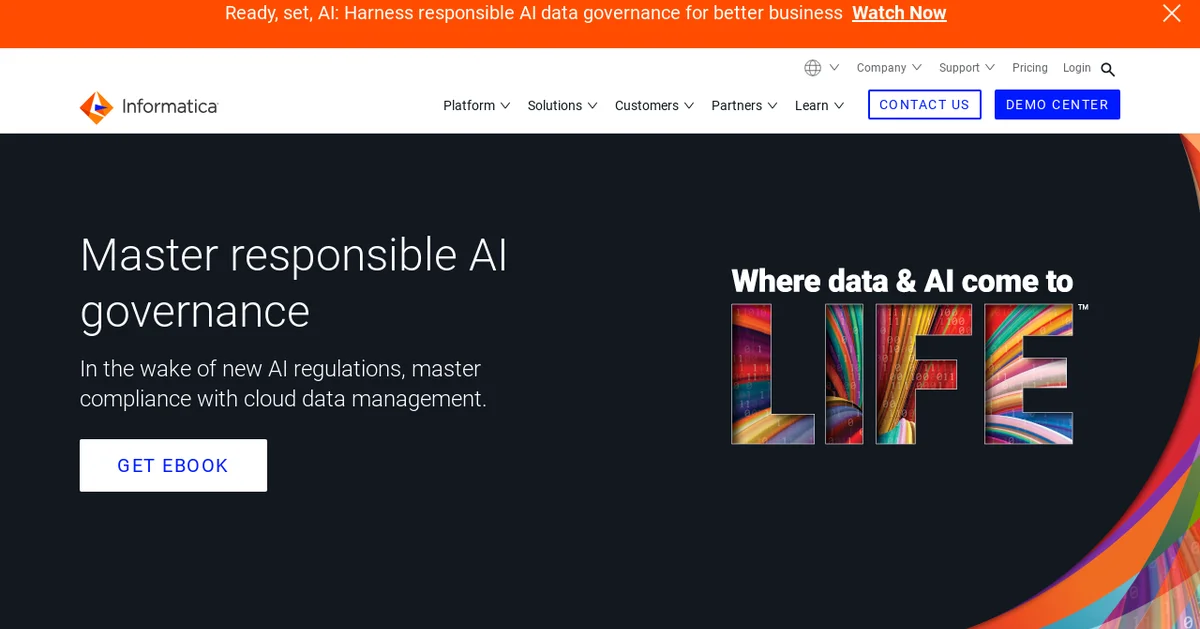
Informatica Intelligent Cloud Services is a strong player in the iPaaS market, enabling businesses to unlock their data’s full potential. The AI-powered platform CLAIRE streamlines data management across various environments, from multi-cloud to hybrid setups. The company aims to connect data, processes, and applications, which is crucial as businesses increasingly depend on AI for decision-making.
One notable feature is its low-code, no-code development approach. This allows users to automate data management tasks without complex coding. The architecture supports open industry standards, making it adaptable to various reference architectures, simplifying integration efforts. As companies work to eliminate data silos, Informatica provides a unified view of customer data, improving decision-making.
Informatica focuses on ensuring data is AI-ready. Their platform automates processes and improves analytics across applications, helping organizations scale their operations. The benefits also extend to investments across multiple use cases, allowing firms to optimize their resources cost-effectively.
Informatica Intelligent Cloud Services presents a compelling option for businesses seeking to integrate their data and prepare it for AI. Their AI-driven features, flexible architecture, and emphasis on reducing data complexity could appeal to organizations aiming for streamlined operations and better insights.
Pros
- AI-powered platform with CLAIRE enhances data management.
- Low-code/no-code features reduce integration complexity.
- Supports multi-cloud and hybrid environments.
- Unified view of customer data helps eliminate silos.
Cons
- May require an initial investment in staff training.
- Comprehensive features could overwhelm smaller businesses.
- Some users might find setup processes complex.
Celigo
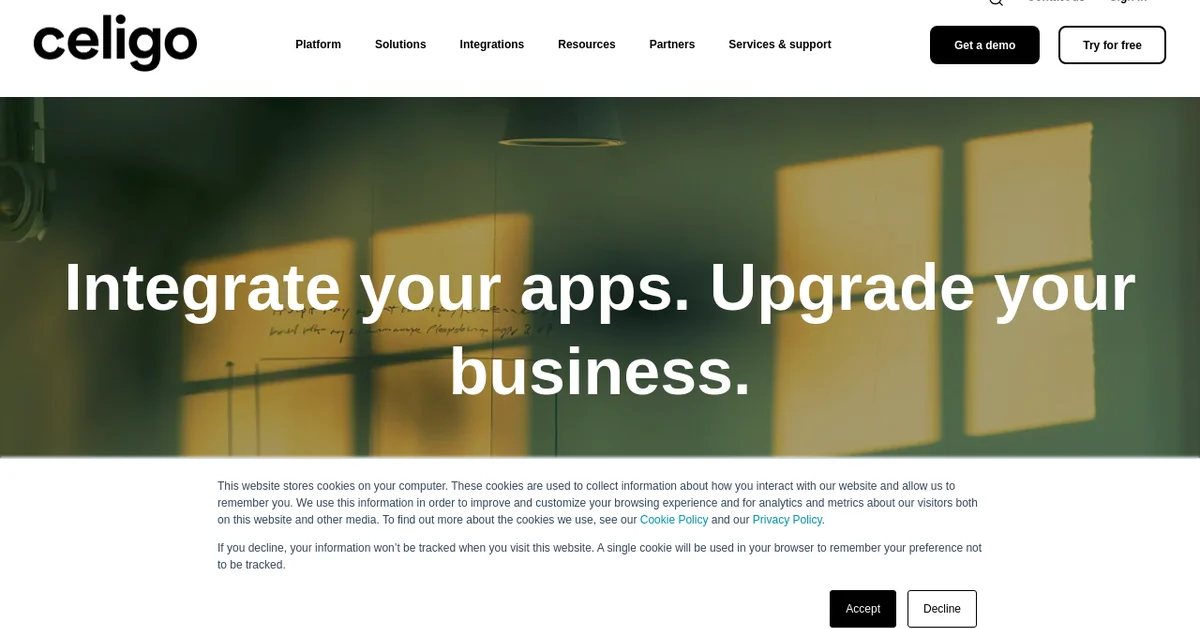
Celigo is an integration platform as a service (iPaaS) that enables businesses to connect their applications and automate essential processes. Celigo simplifies integration by allowing users of all skill levels—technical or non-technical—to engage in automation and integration tasks. This approach helps organizations break down barriers between IT and business teams, facilitating participation in productivity improvements.
A key feature of Celigo is its extensive range of prebuilt connectors and integrations. This marketplace provides hundreds of options, allowing companies to quickly implement the necessary integrations without extensive development time. The intuitive design, improved by AI tools, assists users in addressing integration challenges and managing backlogs efficiently. This combination of power and accessibility sets Celigo apart from other platforms, including alt_17, by promoting collaboration and maximizing the use of existing data.
Celigo’s strong security measures ensure that businesses can trust the platform with sensitive information, positioning it as a reliable choice for companies looking to protect their data while streamlining processes. The platform supports various functions within a business, from eCommerce to finance, enabling users to automate workflows that directly impact their operations.
Celigo offers a robust solution that combines ease of use with powerful integration capabilities. It enables teams to optimize processes, driving growth and improving data consistency.
Pros
- User-friendly interface for both technical and non-technical users
- Extensive library of prebuilt connectors for quick integration
- Strong focus on security and data quality
- Supports automation across various business functions
Cons
- Integration customization may require technical expertise
- Pricing structure may not suit smaller businesses
IBM App Connect
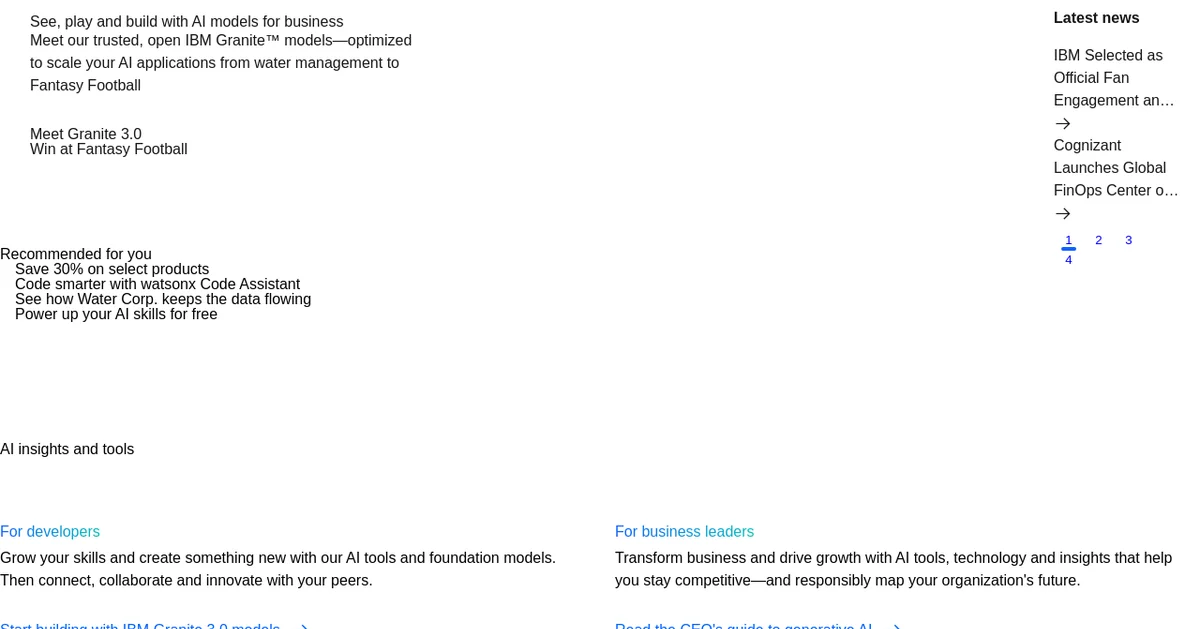
IBM App Connect offers a solution in the Integration Platform as a Service (iPaaS) arena, making it a strong contender alongside alt_17 (Prismatic.io). It helps organizations integrate their applications and automate workflows, improving productivity. With a visual interface and pre-built connectors for various third-party applications, IBM App Connect allows businesses to unify their systems without extensive coding.
A key feature is the ability to use AI capabilities through the IBM Granite™ models. This enhances data processing and management, enabling smarter automated decisions that can adapt over time. Companies looking to improve customer engagement or streamline operations find tools within IBM App Connect to meet their needs. The platform also recognizes data privacy and compliance needs, making it suitable for enterprises concerned about security.
IBM App Connect reflects IBM’s commitment to combining advanced technology with practical business needs. Their consulting expertise complements the software, enabling organizations to apply integration solutions and design robust systems that drive growth. The flexibility to integrate with various databases and cloud environments supports businesses of all sizes.
IBM App Connect is more than an integration tool; it’s a platform that supports businesses in their digital transformation journey. It combines AI with enterprise-ready integrations, making it a solid option for companies exploring their integration strategies.
Pros
- Easy-to-use visual interface
- Pre-built connectors for multiple applications
- Strong AI capabilities through IBM Granite™
- Comprehensive support and consulting options
- Prioritizes data security and compliance
Cons
- May require more technical knowledge for complex integrations
- Pricing could be higher compared to some competitors
- Learning curve for full feature use
Oracle Integration Cloud
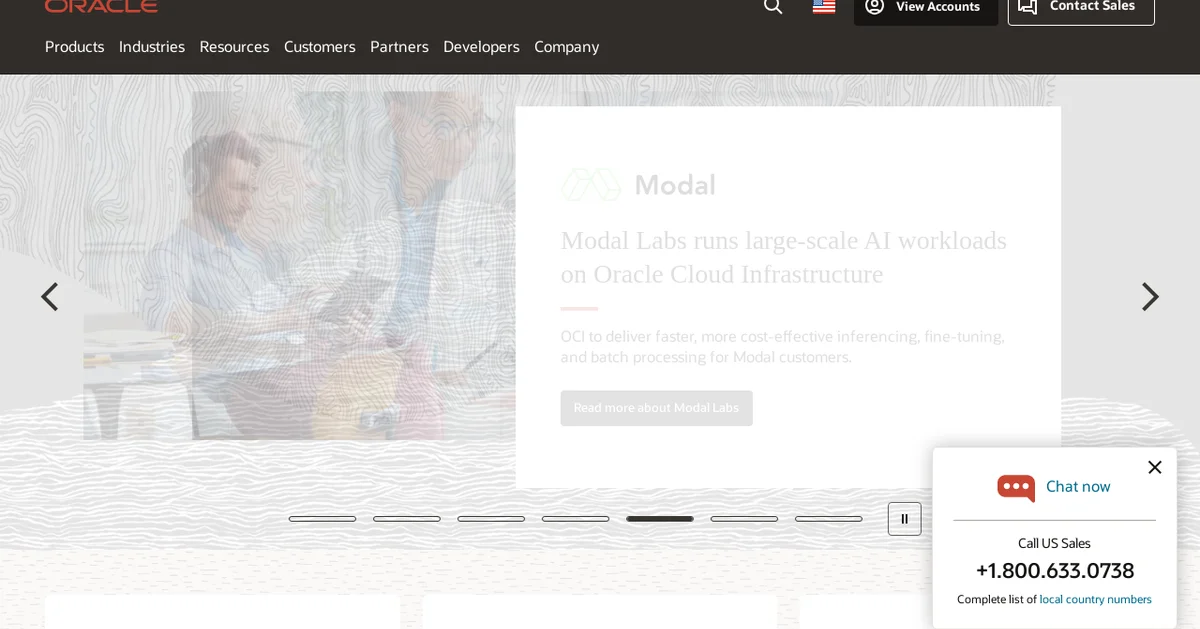
Oracle Integration Cloud is a platform that helps businesses connect apps and automate processes. As part of Oracle’s suite of cloud offerings, it integrates with a wide range of applications, whether cloud-based, on-premises, or hybrid. Oracle has positioned itself as a leader in integration, becoming a popular choice for organizations looking to streamline operations and improve collaboration between systems.
A unique feature of Oracle Integration Cloud is its pre-built adapters that support various applications, saving users time in setting up integrations. Companies can quickly connect platforms such as Salesforce, SAP, and Oracle’s own cloud applications. This feature simplifies onboarding and reduces the complexity of integrations.
Another appealing aspect is the inclusion of advanced capabilities like process automation and data mapping. Oracle has invested in AI and machine learning, allowing the platform to improve integration efficiency and accuracy. Organizations can experience faster data flows and more flexible workflows, leading to better decision-making and operational agility.
Oracle’s story reflects a legacy of innovation. They have been a key player in enterprise applications and cloud computing for decades, earning trust from clients like Uber and MGM Resorts. This experience translates into reliability and security that attract businesses across various sectors, including healthcare and finance, where compliance and data protection are vital.
Oracle Integration Cloud is a strong alternative to Prismatic.io. It offers automation features, a range of integrations, and a commitment to using AI for better service.
Pros
- Extensive library of pre-built adapters
- Focus on automation and process efficiency
- Secure and compliant for enterprise needs
- Deep integration with Oracle’s ecosystem
Cons
- May have a steeper learning curve for new users
- Pricing can be higher compared to some alternatives
Neuron ESB
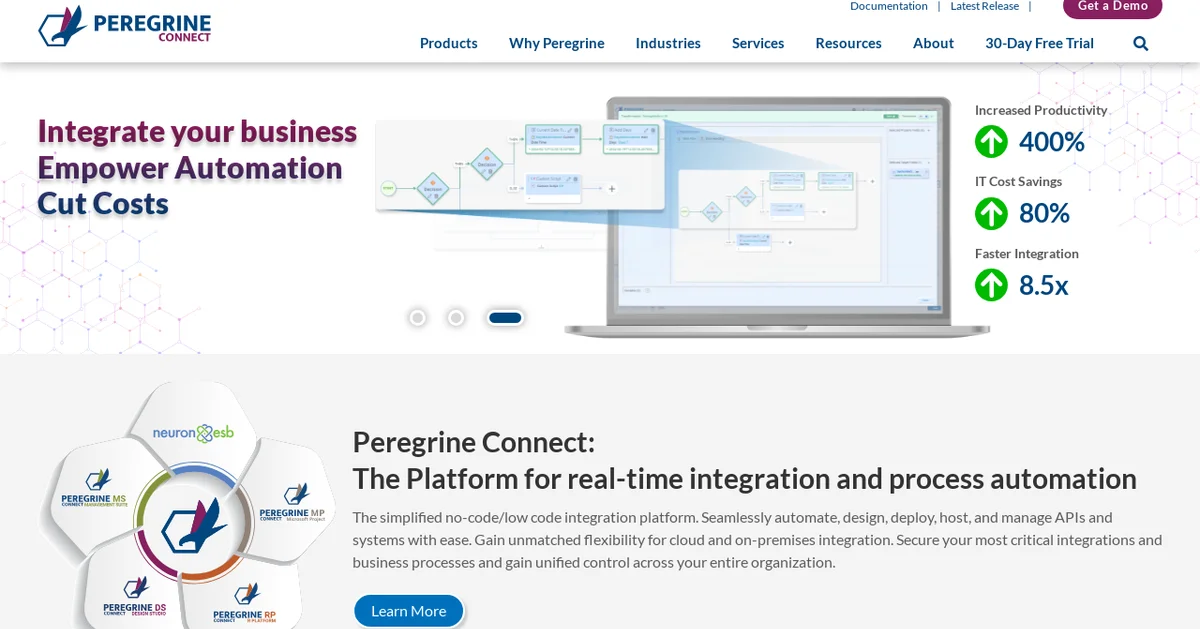
Neuron ESB, developed by Peregrine Connect, serves as a solid alternative to Prismatic.io in the iPaaS market. Its focus on real-time integration and process automation makes it a flexible option for businesses looking to improve operational efficiency. Neuron ESB offers a no-code/low-code platform, enabling users to design, deploy, and manage integration processes without extensive technical skills. This accessibility can significantly shorten integration timelines, which is important for organizations focused on agile execution.
A unique feature of Neuron ESB is its robust Application and API integration capabilities. Businesses can achieve better data cohesion, leading to improved operational efficiency. The drag-and-drop interface is easy to use, allowing users to automate complex workflows. Neuron ESB also supports Kubernetes and Docker, ensuring smooth application deployment, which is key for modern cloud-based architectures.
The platform prioritizes security, employing industry-standard protocols to safeguard both cloud and on-premises integrations. This commitment to security enables organizations to manage their critical processes with confidence. A notable benefit that sets Neuron ESB apart from Prismatic.io is its powerful scheduling capabilities, allowing businesses to run integrations at specific intervals or based on detailed conditions, improving control over operations.
Neuron ESB aims to empower organizations to automate and streamline processes effectively. Many customers report significant reductions in IT costs, with some noting cuts of up to 75%. This leads to less dependence on IT teams for daily tasks and faster business outcomes, showcasing the platform’s practical use.
Pros
- Easy no-code/low-code design
- Advanced API and application integrations
- Strong scheduling and monitoring features
- High security standards for data protection
- Major reductions in IT support costs
Cons
- Implementation may still need some technical knowledge
- May not meet all complex enterprise requirements
- Smaller user community compared to larger iPaaS competitors
Apache Camel
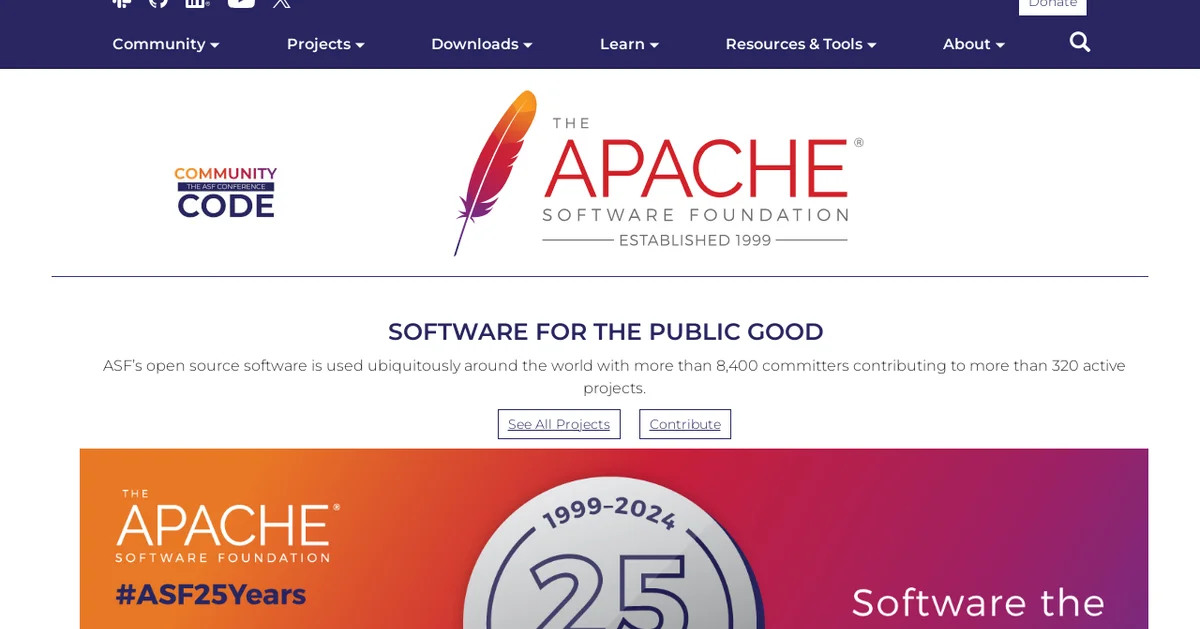
Apache Camel is an open-source integration framework developed by the Apache Software Foundation. It offers a flexible way to connect different applications and services using a variety of protocols and data formats. Camel has become a popular solution for developers seeking to link diverse systems.
Apache Camel’s extensive library of pre-built components and patterns supports various use cases, allowing users to implement complex integrations with minimal coding. It features an easy-to-understand Domain-Specific Language (DSL) that helps developers describe integration patterns. Camel also facilitates message transformations and routing, making it a strong option for those looking to improve operations. Its open-source nature suits organizations that want to modify and adapt solutions to meet specific needs.
The community-driven approach behind Apache Camel leads to ongoing enhancements and broad support from many contributors. This community involvement encourages knowledge sharing and collaboration, benefiting organizations that adopt it. Its compatibility with Spring simplifies integration into existing Java-based applications.
For businesses considering alternatives to alt_17, Apache Camel is a versatile and accessible integration solution that can be customized for various project requirements.
Pros
- Open-source nature allows for flexibility and customization
- Extensive library of pre-built components speeds up integration
- Strong community support for knowledge sharing
- Intuitive DSL simplifies complex integrations
Cons
- Learning curve for new users unfamiliar with integration concepts
- May require extra configuration for specific use cases
- Performance can vary based on the complexity of the integration pattern
SAP Integration Suite
SAP Integration Suite is a platform enabling businesses to connect applications, data, and processes across different environments. It stands out in the iPaaS field by offering a mix of pre-built connectors and APIs that simplify integration with SAP solutions and third-party applications. This flexibility helps businesses streamline operations and achieve cohesive workflows.
SAP started by focusing on enterprise resource planning (ERP) software before expanding into various digital transformation areas. This evolution places SAP Integration Suite at the forefront of system integration for organizations adapting to modern demands. Companies can use its features for real-time data exchange, ensuring important information flows smoothly across departments.
A key aspect of SAP Integration Suite is its integration with SAP Business Technology Platform. This connection allows businesses to access data analytics and artificial intelligence, enabling informed decisions based on real-time insights. The suite also supports event-driven architecture, promoting collaboration across disconnected systems, which can be crucial for organizations facing integration challenges.
Its commitment to flexibility is another important feature. Companies benefit from an open integration approach that encourages experimentation and innovation, making it easier to adapt to changes or explore new business models.
When comparing SAP Integration Suite to alternatives like Prismatic.io, its capability to manage complex enterprise integrations can be a deciding factor. The suite offers extensive features tailored to businesses with various needs, such as supply chain management, customer experience, and finance.
Pros
- Seamless integration with SAP products
- Advanced analytics and AI capabilities
- Flexibility in integration approaches
- Event-driven architecture for improved collaboration
Cons
- Complexity can be overwhelming for smaller businesses
- Higher costs associated with enterprise-level solutions
- Learning curve for teams unfamiliar with SAP products
Dell Boomi
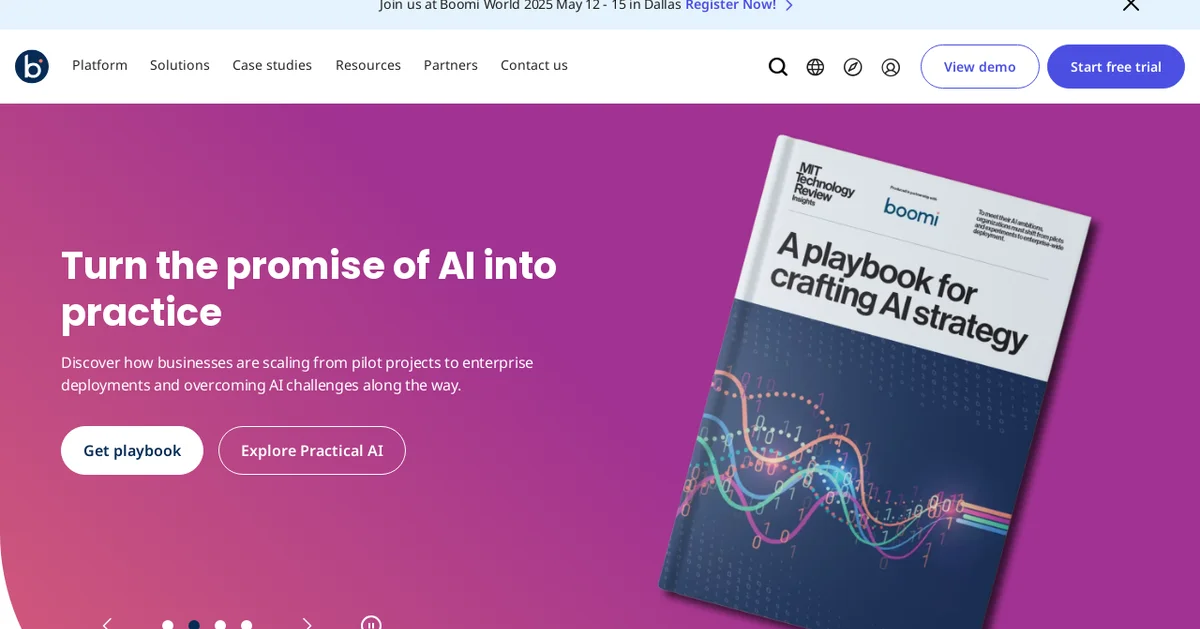
Dell Boomi is a key player in the iPaaS landscape, offering solutions for API management, integration, and data management. With over 20,000 global customers, their presence is significant. The platform simplifies complexities, allowing organizations to connect applications and data seamlessly using automation tools.
A standout feature is its library of pre-built connectors, making it easier for businesses to integrate multiple applications without starting from scratch. This saves time and resources, valuable for organizations. Their API Control Plane enables companies to manage and govern their APIs efficiently, consolidating security and streamlining workflows. This is especially useful for environments relying on ServiceNow that need strong API management.
The story behind Boomi is interesting. They started as a cloud-based integration facilitator and have evolved into a comprehensive solution, continuously adapting their offerings based on real-world business needs. This approach helps ensure customers can meet the demands of the digital landscape effectively.
For businesses wanting to improve their operational and analytical capacity, Boomi’s focus on data management is a key advantage. The platform provides a centralized system for managing data, helping organizations maintain a reliable data ecosystem while reducing complexities.
Pros
- Library of pre-built connectors speeds up integrations.
- Strong API management features to centralize and secure APIs.
- Robust data management ensures trusted and synchronized data.
- Automation tools improve productivity and operational efficiency.
Cons
- Complexity may arise for organizations new to these platforms.
- Initial setup can require a significant investment of time and resources.
- Pricing might be higher compared to other options.